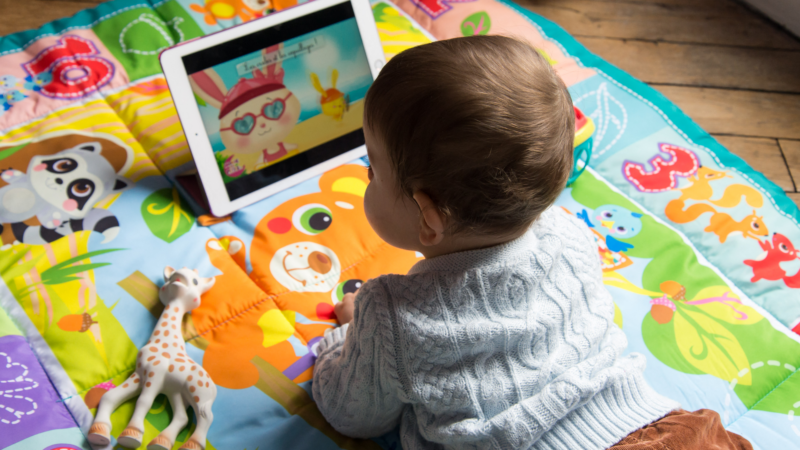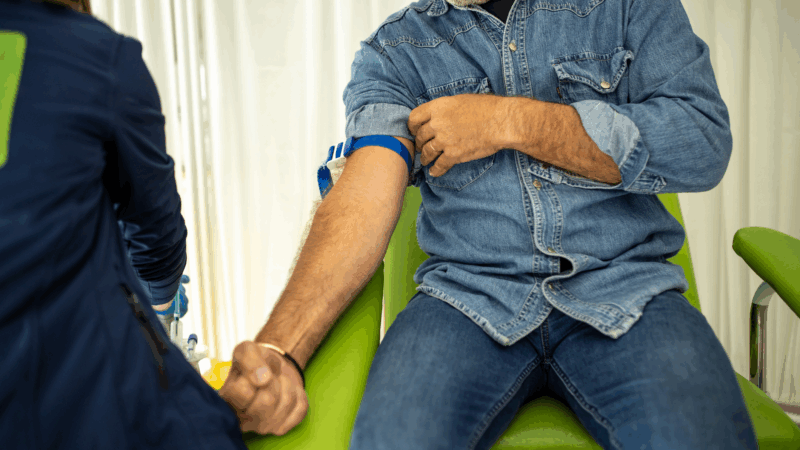Tablets for tots? Survey says kids watch videos on their own devices by age 2
Forty percent of toddlers have their own tablet device by the time they are 2 years old, according to a report released Wednesday by Common Sense Media.
The report looked at media habits in kids 8 years old and younger and measured daily behavior such as time spent looking at screens, what kind of programming kids consumed, and differences in habits depending on gender and socioeconomic status.
The report surveys parents about their children’s media use, and the most significant changes it has found over the last few years were not in the amount of time kids spend on screens, but in the way they consume media and the type of media they consume. Increasingly, children are watching very short form videos on algorithm-driven platforms like TikTok, Instagram Reels and YouTube Shorts.
Sonny Thadani, who lives in New York City and works in tech, has resisted giving his three young kids their own devices. But he and his wife do deploy screens at various times.
“A car ride, an airplane ride, at a busy time at home where you don’t have the support — we rely on technology,” he says.
Thadani says he still struggles with when and how much to let his kids use devices.
“Do we rely on it as parents too much? And is that our first sort of answer? And I think for me, sometimes it is,” he admits. “It’s one of the challenges I have as a father — doing all the things that I want to accomplish personally and professionally.”
Jim Steyer is CEO of Common Sense Media, which is a nonprofit research and advocacy organization. Steyer says while there is no panacea for managing screen time, there are helpful strategies.
“Delay, delay, delay,” says Steyer, referring to when parents should start letting their children use various devices. “Whether it’s a cellphone, a tablet or whatever.”
It’s important, says Steyer, for parents to know what their kids are doing on screens. Many shows, apps and games for young children, he says, are designed to be especially engaging on handheld devices. The more autonomy children have over these devices, the more danger they present, he says.
“Young children now average two-and-a-half hours of daily screen time, predominantly watching short-form video content,” says Steyer.
He advises parents to steer their children towards healthier content, like educational programming, and to watch programs alongside children and discuss the content with them. It’s important, says Steyer, to bring kids into conversations around safety controls and other precautions, such as turning off autoplay.
“ If you go on a device with your child and explore the content with the child, It’s a much more enriching experience for the child and for yourself,” says Steyer.
This was the first year the survey asked questions about artificial intelligence. Nearly one in three young kids now uses AI for learning, which Steyer says presents a unique set of new obstacles since it’s difficult for kids to disentangle what is true or not with information presented to them by AI.
Between 75% and 80% of parents say they are concerned about how their kids are using screens, including worries about what it is doing to their attention spans and mental health.
There’s no doubt screen time is a daunting problem, says Steyer. But the worst thing parents can do is throw up their hands and ignore it.
The report is based on an online survey completed by a representative sample of 1,578 parents of children age 8 and younger; it was conducted in August 2024.
A Jan 6 rioter convicted of assaulting police scored a visit to the White House
Two pardoned Jan. 6 rioters posted photos and videos of themselves visiting the White House. One of them was convicted of assaulting police and texted after the riot, "I have murder in my heart."
The pros and cons of PSA tests for prostate cancer for midlife and older men
With Biden's prostate cancer in the news, men may be wondering whether and at what age to be screened. Advice about the value PSA tests has fluctuated. Here's what to know.
Former Kennedy Center president refutes Trump’s critique of ‘bad management’
"I am deeply troubled by the false allegations regarding the management of the Kennedy Center," Deborah Rutter wrote in a statement.
First FDA-cleared Alzheimer’s blood test could make diagnoses faster, more accurate
The first Alzheimer's blood test cleared by the Food And Drug Administration is poised to change the way doctors diagnose and treat the disease.
‘Which is it?’ RFK Jr. waffles on cuts to lead poisoning prevention efforts
Health Secretary Robert F. Kennedy Jr. faced tough questions from senators about a lead poisoning crisis in public schools in Milwaukee, Wisconsin.
U.S. Ambassador Huckabee is ‘outraged’ at European leaders for condemning Israel
In an interview with NPR, U.S. Ambassador to Israel Mike Huckabee said the U.K., Canada and France were "blaming the wrong perpetrator," and that Hamas is responsible for the suffering in Gaza.







